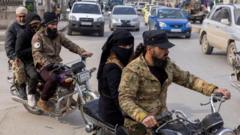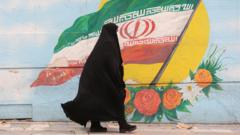Tensions in Georgia have escalated as thousands demonstrate against the government's suspension of its EU membership bid, prompting the arrest of opposition leader Nika Gvaramia.
Georgia's Political Crisis Deepens Amid Arrest of Opposition Leader

Georgia's Political Crisis Deepens Amid Arrest of Opposition Leader
Following a series of protests against the government's EU accession delay, security forces have intensified actions against opposition members, raising concerns over political freedoms.
In a striking move indicative of a broader political repression, Georgian authorities detained Nika Gvaramia, a prominent opposition leader, on Wednesday, potentially signaling a shift towards authoritarianism amid rising tensions with Russia. The incident unfolded when security agents executed a surprise raid at the offices of Gvaramia's party in Tbilisi during escalating protests against the government's recent announcement to delay European Union accession for several years.
Witnesses reported that the detained leader attempted to assert his right to enter the office but was forcibly removed by agents in masks and tactical gear, raising alarms among onlookers about the growing security crackdown. Demonstrators, now a common sight outside Parliament, have expressed their discontent with the ruling party's pivot away from Europe, a move many perceive as an invitation for Russia's influence to reestablish a foothold in Georgia.
In scenes characterized by chaos and unrest, law enforcement has reportedly responded violently to ongoing protests, with numerous individuals suffering injuries and many more detained. This crackdown has extended beyond demonstrators, encompassing searches of political offices and homes belonging to noted activists, prompting fears among Georgians that their country's alignment with European values could be irrevocably altered.
Surveys illustrate a prevailing sentiment among the population favoring EU membership despite the government's recent maneuvers, highlighting a disconnect between the ruling party and the public's aspirations. The ongoing strife is a stark reminder of Georgia’s historical enmity with Russia, especially following the 2008 conflict that left parts of its territory occupied.
As citizens voice their discontent in the streets, the future of Georgia's political landscape remains uncertain, underscoring the broader implications of Gvaramia's arrest in the context of the nation's quest for identity and alignment in a geopolitically complex region.
Witnesses reported that the detained leader attempted to assert his right to enter the office but was forcibly removed by agents in masks and tactical gear, raising alarms among onlookers about the growing security crackdown. Demonstrators, now a common sight outside Parliament, have expressed their discontent with the ruling party's pivot away from Europe, a move many perceive as an invitation for Russia's influence to reestablish a foothold in Georgia.
In scenes characterized by chaos and unrest, law enforcement has reportedly responded violently to ongoing protests, with numerous individuals suffering injuries and many more detained. This crackdown has extended beyond demonstrators, encompassing searches of political offices and homes belonging to noted activists, prompting fears among Georgians that their country's alignment with European values could be irrevocably altered.
Surveys illustrate a prevailing sentiment among the population favoring EU membership despite the government's recent maneuvers, highlighting a disconnect between the ruling party and the public's aspirations. The ongoing strife is a stark reminder of Georgia’s historical enmity with Russia, especially following the 2008 conflict that left parts of its territory occupied.
As citizens voice their discontent in the streets, the future of Georgia's political landscape remains uncertain, underscoring the broader implications of Gvaramia's arrest in the context of the nation's quest for identity and alignment in a geopolitically complex region.





















